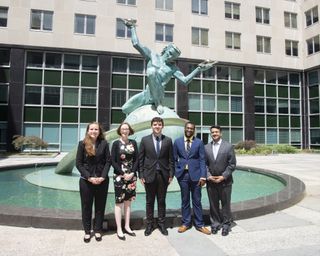Working for an embassy or consulate in a foreign country might not be the career path most IT professionals take, but that’s part of what appealed to Enoch Masih, an information technology major at the University of Massachusetts Lowell.
“IT has so many different options but this is certainly a unique one, getting to travel so far away and also being able to do something that serves your country in a small way,” Masih says.
Masih is a Foreign Affairs Information Technology (FAIT) Fellow. The program is run by the U.S. Department of State and The Washington Center for Internships and Academic Seminars, and provides students pursuing an IT-related bachelor’s or master’s degree the opportunity to apply to practice their tech skills internationally while serving U.S. diplomacy.
The fellowship provides academic funding (up to $75,000 for two years), two summer internships with paid stipends, and leads to an appointment in the Foreign Service as an Information Management Specialist for at least five years.
The program was launched in 2017 with the first cohort consisting of five fellows. Currently, 15 fellows are accepted each year.
“The need for information management specialists is just expanding, and the need for technology in every industry continues to expand,” says Chelsey Jones, senior manager, federal programs Senior Manager for the FAIT Fellowship. “You don't generally think about IT as an international relations, State Department, Foreign Service kind of role, but it is and it will continue to be.”
International IT Work
Former FAIT Fellow Ryan Butler is now stationed at the U.S. Consulate in Toronto. When people hear he works in IT at a U.S. Consulate, they sometimes get an image from the movies of computer wizards fending off cyber hackers in a dark room with 15 monitors.
“It's not like that at all, I've got one monitor,” Butler says. “We read emails. We do all the normal IT stuff.”
However, the lack of glamor and intrigue doesn’t make it any less appealing.
“I've enjoyed it,” he says. “Not one day has gone by where I don’t think ‘I love this job. I love what I'm doing.’”
While Canada is not the most distant country one could be stationed at, Butler says it’s very different from his native Florida. He’ll be moved to a new location in a few years.
“It's an exciting life, I wouldn't trade this for anything,” he says. He’s planning on working beyond his five-year commitment. “I want to stay here until I have to retire. Until the future secretary or president says, ‘Ryan, get out.’”
What to Know Before Applying
Applications for the FAIT Fellowship are open through the end of January.
To apply, one must be a U.S. Citizen studying IT with a 3.2 overall GPA. “No specific degree programs or majors are preferred but a strong application demonstrates understanding of the FAIT Fellowship, clear research into the Information Management Specialist position, and a desire to use IT-skills to support U.S. diplomacy across the world,” Jones says. “The program also values diversity of identity and experience -- women, members of minority groups historically underrepresented in the Foreign Service, and those with financial need, are encouraged to apply.”
An undergraduate track and a graduate track are both available, each with specific timing required for applications. “Folks should either apply as a sophomore or in pursuit of graduate school before they've applied to grad school,” Jones says.
Unfortunately, exceptions cannot be made for juniors or seniors, or for graduate track applicants who have already been accepted to graduate school, Jones says.
For the application itself, Masih says to focus on the little things, going through each requirement, and making sure every word of the personal statement counts.
Jones adds that the personal statement is really the best opportunity to make your application stand out. “The panelists who review the applications see a million transcripts, they look at a ton of financial aid information, but the things that they talk about is a good personal statement,” he says. “I would add to that a very personalized letter of recommendation. Those are things that take a good application and make it great.”


